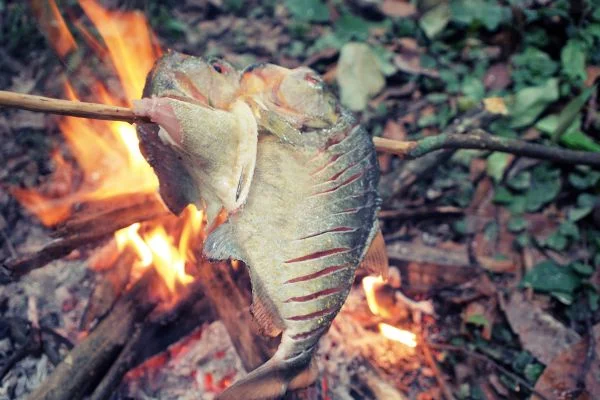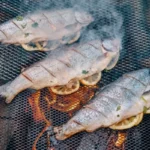The ability to clean and cook fresh fish while camping is a skill that all outdoor adventurers should strive for. Whether you’ve caught your own or purchased it from a local market, fish provides an excellent source of protein when out on the trail. Let’s discuss how to clean and cook fish while camping.
To clean and cook fish while camping, first gut and scale it near water. Season with herbs, wrap in foil, and cook over the campfire for a delicious meal!
Should Fish Be Cleaned Before Cooking?
Yes, it is essential to clean fish before cooking. Doing so helps to ensure that any parasites or bacteria are removed and that the fish is safe to consume.
When preparing to clean a fish, first decide whether to scale and gut it or rinse off its surface. If you plan on scaling the fish (a process of removing the scales with a sharp knife or scaler), this should be done before gutting it, as many of the innards can stick to them when pulled away from the body cavity. This will also give you access to score the flesh for ease later in cooking.
Gutting requires cutting a slit from just behind the gills down towards, but not including, the vent area at its tail base, although some species need holes cut into their abdomen for cleaning purposes. Furthermore, whether cooked filets are desired or whole-cooked specimens, removal of parts such as fins, head, and tail may be necessary after gutting.
Once your preparation is complete, use cold running water over all surfaces of your cleaned specimen while rubbing gently with your hands until no foreign substances remain – this may take up to 20 minutes to thoroughly remove any dirt lodged tightly around specific areas like those between gill plates so don’t skimp out on time! Finally, pat dry with paper towels, and your fresh catch is ready for whatever culinary adventure awaits!
Also Read: Cooking Burgers On a Blackstone Griddle- 2023 Guide
How To Clean And Cook Fish While Camping | Proper Guide

Cleaning Your Catch
When cleaning fish, be sure to use a sharp knife. Start by cutting behind the gills and slicing through towards the tail until you reach the backbone. Turn the fish over on its back and make another cut from tail to gill along the top side of the fish until you get the backbone again.
Then peel away both sides of the filets from their respective sides simultaneously. There should now be two filets with skin attached. Finally, scrape off any remaining scales with your knife before removing any pin bones with tweezers.
Cooking Your Fish
For those used to cooking in a kitchen, one of the biggest challenges may be learning to cook over an open flame or hot coals. It is essential to cook your food sparingly as it can dry out quickly when cooking in this manner.
A good rule is to cook over medium-high heat for about 5 minutes per side or until almost done through, then reduce heat slightly and cover with foil for another 2-3 minutes or until cooked through thoroughly (depending on thickness).
Making it Delicious!
Fish can be seasoned in many different ways. Still, some popular options include garlic butter, lemon pepper, paprika/cayenne pepper mix, salt & pepper mix, or even just olive oil & herbs!
Depending on what flavors you prefer and what ingredients you have access to at camp will determine which seasoning option is best for you!
Other great ideas include adding vegetables such as onions & peppers or topping with fresh lemon slices right before serving – yum!
Also Read: What Food To Take Camping Without Cooking?
What Is The Most Humane Way To Fish?
The most humane way to fish involves fishing with a barbless hook, using a quick and steady technique to ensure the fish can be unhooked quickly and released back into the water.
This way of fishing minimizes any suffering of the fish, as well as reducing the chances of them ingesting the hook or being too severely injured during removal that they can’t survive.
Fishers should also carefully research their catch before they set off to fish so they know what size and kind of techniques are necessary for that fish species and so they can release them back safely into their environment when done.
By balancing respect for nature with a passion for fishing, fishermen can peacefully coexist with aquatic wildlife while simultaneously enjoying their favorite activity.
Also Read: Ultralight Backpacking Cooking Gear | 5 You Must-Have In 2023
Bottom Line:
How to clean and cook fish while camping? Cooking fresh fish while camping can initially seem intimidating, but it doesn’t have to be!
By following these simple steps – cleaning your catch carefully and thoroughly, cooking evenly over medium-high heat, and seasoning deliciously – your meal will be one that everyone will remember long after they leave camp! So go ahead and try it – you won’t regret it! Happy fishing (and eating)!



